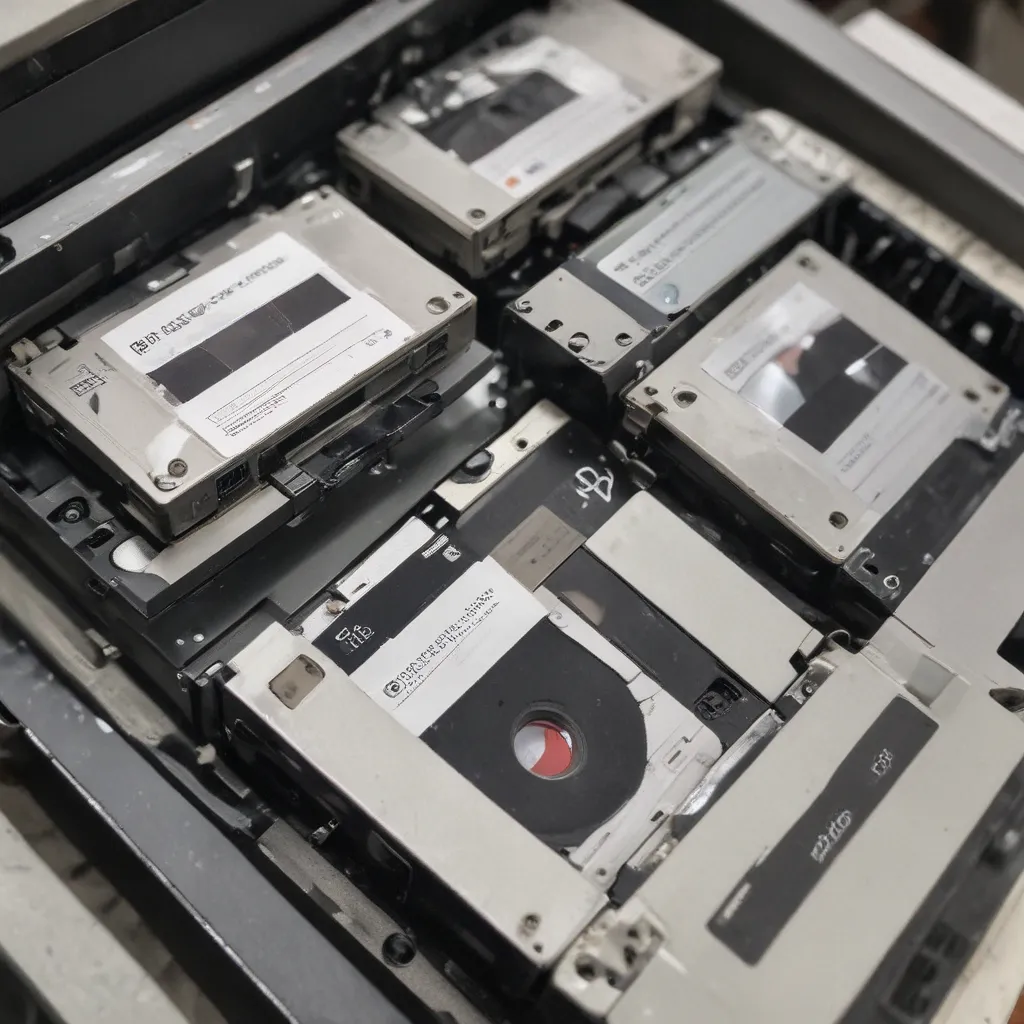It’s the year 2024, and I can hardly believe I’m even writing these words, but here we are: floppy disks are still a thing. Sure, they’ve been largely obsolete for over two decades, but there are still countless troves of data trapped on those little 3.5-inch magnetic marvels, waiting to be liberated. And as a computer repair technician, it’s my mission to help people like you do just that.
The Floppy Disk Renaissance
I’ll never forget the day a frantic customer came bursting through the doors of my shop, a tattered shoebox filled to the brim with old floppy disks. “Please, you have to help me!” she pleaded. “I’ve got family photos, work documents, all sorts of important stuff on these disks, and I have no way to access them!” [1] It was a story I’d heard countless times before, and one that always tugged at my heartstrings.
You see, as much as we’d all love to forget about floppy disks, the reality is that they were the dominant storage medium for decades. And for many people, those dusty disks sitting in the back of a closet or attic represent a lifetime of memories and irreplaceable data. But with modern computers eschewing floppy drives in favor of sleeker, more compact designs, how on earth are we supposed to get that information off those archaic little platters?
The Quest for a Floppy Drive
My first instinct was to scour the internet for a solution. Surely, in this age of retro-tech nostalgia, there had to be some way to get my hands on a floppy drive that would work with a modern PC, right? After all, I’d heard rumors of the U.S. government still using floppy disks to control their nuclear arsenal. [2] If the military could do it, how hard could it be?
As it turns out, finding a compatible floppy drive is actually quite the challenge. I spent hours scouring eBay and online electronics stores, only to be met with a dizzying array of options, each with their own set of caveats and compatibility issues. [3] Some drives claimed to support multiple disk formats, but reviewers warned of finicky performance and unreliable results. Others were little more than glorified USB card readers, incapable of actually writing data back to the disks.
The Floppy Disk Whisperer
Just when I was about to give up hope, I stumbled upon a forum post that changed everything. It was written by a self-proclaimed “floppy disk whisperer,” a retro-computing enthusiast who had spent years perfecting the art of floppy disk data recovery. [4] He explained that while many modern USB floppy drives might work for basic file access, if I really wanted to ensure the integrity of my customer’s data, I’d need to invest in a high-quality, vintage drive specifically designed for the task.
Armed with this newfound knowledge, I set out on a quest to track down the perfect floppy drive. It wasn’t easy – these devices are becoming increasingly rare and expensive as the years go by. But after scouring local electronics swap meets and even reaching out to a specialized repair shop in Marietta, I finally found what I was looking for: a pristine, refurbished 3.5-inch floppy drive, complete with all the necessary cables and drivers.
Bringing the Past into the Future
With my trusty floppy drive in hand, I set about the delicate process of extracting data from my customer’s collection of disks. It was a painstaking task, requiring meticulous handling and a gentle touch. [5] I couldn’t help but feel a sense of wonder as I watched those aging magnetic platters spin to life, their contents slowly but surely being transferred to the safety of my computer’s hard drive.
As I worked, I couldn’t help but marvel at the resilience of this seemingly outdated technology. Sure, floppy disks may be fragile and prone to degradation, but the data they contain can often outlive more modern storage mediums. [6] In fact, I’ve heard stories of government agencies still relying on 8-inch floppy disks, some of which are nearly 30 years old! [2]
Preserving the Past for the Future
Of course, not every floppy disk I encountered was in pristine condition. Some were marred by physical damage, while others had fallen victim to the ravages of time and entropy. [5] But thanks to my trusty floppy drive and a bit of old-school know-how, I was able to recover the vast majority of my customer’s data, much to her delight.
As I carefully backed up those irreplaceable files, I couldn’t help but feel a sense of pride. I may be a computer repair technician in the 21st century, but in a way, I was also a guardian of digital history – a steward of the floppy disk era, ensuring that the stories and memories trapped within those little magnetic discs would not be lost to time. [7,8]
And who knows? Maybe in a few years, I’ll be helping another customer extract data from their collection of vintage CDs and DVDs. After all, in the ever-changing world of digital storage, one thing is certain: the past is always just a floppy disk (or a USB drive) away.
References:
[1] https://www.pcworld.com/article/456832/how-to-access-your-old-3-5-inch-floppy-disks.html
[2] https://www.cnn.com/2021/06/09/politics/us-nuclear-weapons-system-uses-floppy-disks/index.html
[3] https://answers.microsoft.com/en-us/windows/forum/all/retrieving-info-from-old-floppy-disks/d6218adb-c25a-46d4-88b3-ab56cdae3e51
[4] https://www.reddit.com/r/vintagecomputing/comments/14bxro7/can_you_help_me_read_my_525_floppy_disks/
[5] https://retrocomputing.stackexchange.com/questions/639/how-long-will-floppy-disks-maintain-data-integrity
[6] https://www.vogons.org/viewtopic.php?t=89432
[7] https://discussions.apple.com/thread/254924595
[8] https://gearspace.com/board/so-much-gear-so-little-time/453492-getting-data-off-old-atari-st-floppy-disks.html













